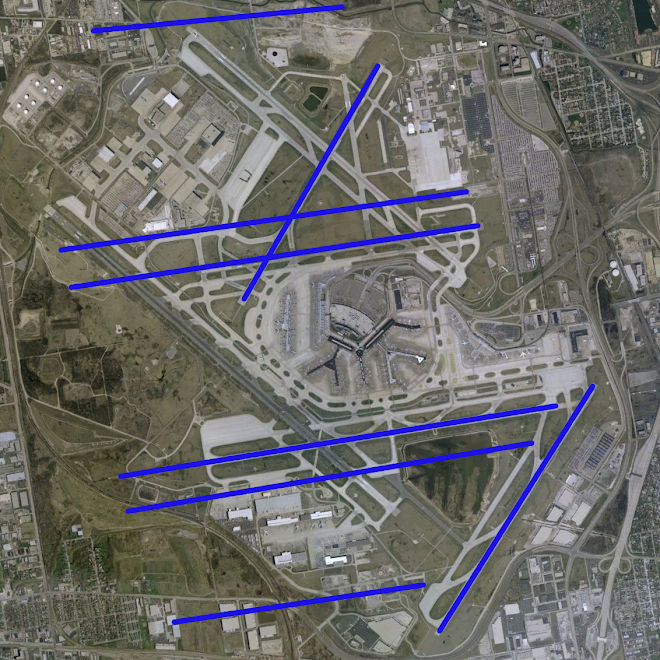The airlines’ stinging rebuke (see below) to Chicago Mayor Richard Daley’s O’Hare expansion plans leaves an obvious question:
If O’Hare expansion isn’t the answer to the crowded skies over Chicago, what is?
The answer has been out there for decades: a new south suburban airport. And fortunately, the groundwork already has been laid. A commission of Chicago suburbs won agreement from two international public works developers to design, finance, build and operate the new airport—at virtually no public cost.
Sadly, Daley and his cronies have stymied those plans, so what could have already been is still a cornfield. It now will take a major shift in political, civic and business alliances to restart the project, if it is not too late. The economic downturn and the credit crunch may have cooled the developers’ interest—which had previously remained strong despite Daley’s assault on the project.
One of the first issues that needs to be settled is: Who would control the new airport? Interest for the new airport had stagnated while Daley was pushing O’Hare expansion, until a group of southern suburbs plus O’Hare neighbors Bensenville and Elk Grove Village got the project untracked. Under the bi-partisan leadership of Rep. Jesse Jackson, Jr. and the late Rep. Henry Hyde, the group formed a commission that was close to signing up the international developers, until Daley, seeing his cherished O’Hare jobs and contracts threatened by the competition, “put a brick on” the development.
In this, he rounded up a wide array of allies in the public and private sector, but in his most effective move, he created a competitor to the Jackson group. Will County, which had previously shown no interest in the airport, suddenly insisted that it, and not the Jackson group, had the exclusive authority to build the airport. Daley was able to work this magic because Democratic influence was growing in the previously solid Republican county, and whatever quid pro quos the powerful Democratic Chicago mayor could offer were eagerly sought and accepted there. Opposition to the Jackson plan was the price they willingly paid.
In an irrational and wasteful twist, the Illinois Legislature and the Illinois Department of Transportation, did the un-Solomon like thing and spilt the baby. Rejecting the developers who were on the doorstep and ready to begin, they gave the competing groups equal—as it were—standing to build and run the airport. Back to square one in the lengthy bureaucratic board game, the two now are seeking separate approvals from the FAA (which years ago had backed the project) and the state. So now the state has become so mired in “process” that the airport’s start is nowhere in sight—an outcome that suits Daley just fine, giving him time to make his O’Hare expansion a fait accompli.
One thing was wrong, however, with Daley’s scheme. The expansion plan was bound to fail of its own weight. He was blinded by his determination to hold on to O’Hare patronage and put too much faith in the yes-people who surrounded him, and assured him that the expansion was “doable.”
How now to re-energize the south suburban airport? The first gigantic hurdle is to get the major players who supported the expansion to admit that they were wrong. Daley might never do this, but the business, civic, media and labor community that so gladly fell in behind the mayor’s ego can perhaps turn the tide. They owe it to the body politic.
The Federal Aviation Administration, too, will have to reassert its expertise, instead of collapsing as it did before powerful political forces in the city, state and Washington that were aligned with Daley. The FAA years ago had said that the south suburban airport was the best solution, and nothing has changed to justify abandoning that position.
Now comes the hard part: Anything that happens will need state approval, and Illinois is so racked with mis- and mal-governance that it is hard to imagine rational decision-making ever happening. That state is $4 billion—almost $5 billion—in the red, and no solution is in sight. Perhaps the prospect of privately financed jobs and contracts—which will be so rare in the near future—would help them decide to back the new airport.
As for Daley, Jackson’s group had repeatedly said they would be glad to split the patronage with the mayor. It was a price they were willing to pay to move ahead with a solution that would be beneficial for the entire region. Sharing the spoils may look a bit more attractive to Daley now that the airlines have thrown a wrench into the O’Hare works. Then, again, sharing has never been one of Daley’s strong points.
Subscribe to:
Post Comments (Atom)



_Final.png)
No comments:
Post a Comment